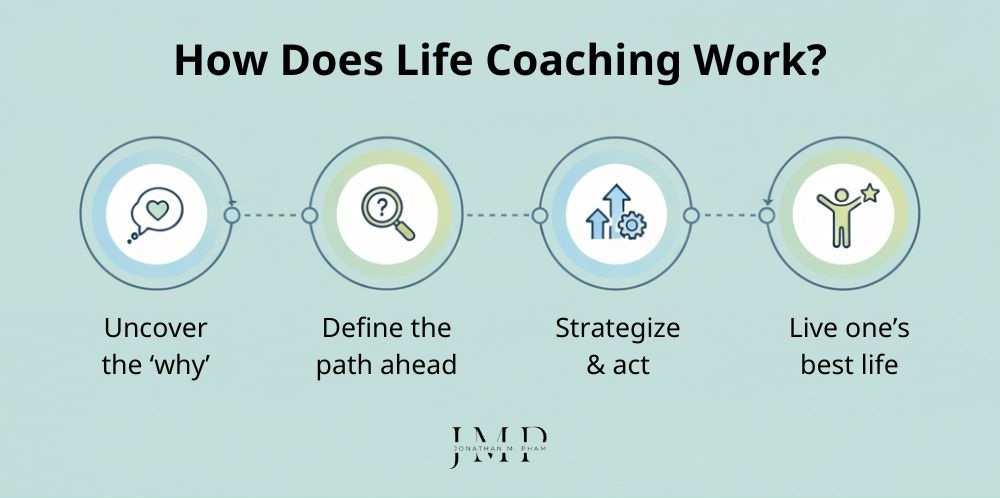Life coaching is a powerful tool that has the ability to transform and facilitate positive changes in one’s life.
Do you ever feel a pervasive sense of imbalance, despite external successes? Perhaps you’re navigating a significant life transition, battling self-doubt, or simply seeking a clearer direction amidst the noise of daily life. For many, the pursuit of happiness often feels fragmented – and that’s where practices such as life coaching come in to save the day.
Highlights
- Life coaching is an empowering process where a trained professional guides individuals to define their values, set clear objectives, and create actionable plans to realize their potential and facilitate positive change. An essential and powerful tool for self-growth, it provides a supportive environment and guidance for one to understand themselves, make meaningful changes, improve self-confidence, manage stress, build healthy habits, and enhance overall well-being and success.
- While both aim to improve an individual’s life, life coaching focuses on practical goal achievement and future-oriented personal growth, whereas therapy concentrates on treating mental health issues and exploring past experiences.
- When searching for a life coach, it’s recommended to consider factors such as their experience and specialization, certification and professional standing (like ICF), availability and scheduling flexibility, specific coaching style, attitude, fees, and any available recommendations and testimonials.
- To maximize your life coaching experience, you should strive to remain open to new ideas and feedback, commit to taking consistent action on the plans you develop, and take responsibility for your progress.
What is Life Coaching?
Life coaching is an empowering process aimed at enabling individuals to take control of their lives and realize their full potential. Through the guidance of a trained professional coach, one learns to explore new possibilities and create positive changes in all areas of life – including physical health, mental well-being, emotional state, spiritual beliefs, and social relationships.
In a life coaching relationship, the two parties (the coach and the coachee) start by setting clear objectives – while also taking into account any existing fears or concerns that may be standing in the way of progressing toward their desired outcomes. With the guidance of their coach, the coachee comes up with a detailed plan – including specific, achievable steps for reaching those goals. This plan could include regular meetings with the coach to provide accountability and reinforcement for staying on track with their objectives.
During the journey, the life coach’s role is to offer feedback and utilize tools such as goal-setting exercises to further facilitate progress.

How Does Life Coaching Work?
The process begins with the coach engaging their client in discussions about what it is that they value and what kind of life they would like to create. The coach then collaborates with the coachee to define the latter’s life purpose – one that is both exciting and resonating deeply to them – which serves as the foundation for everything else.
Once this first step is finished, the coach may utilize techniques such as reflective questioning, active listening, paraphrasing, etc. so that the client may better understand how their purpose may turn out when realized. This could include anything from career aspirations or relationship goals – to physical health objectives and financial ambitions.
Next, the two work on defining what it takes to visualize this vision – specific action steps to take. Support systems such as apps, calendar reminders, etc. may be considered to ensure progress and success along the way.
All in all, life coaching offers an opportunity for holistic personal growth by cultivating awareness around one’s true gifts, strengths, and values – so that these may be leveraged for positive change in all areas of life. With clarity on how they wish to become – plus what it takes to “get there” and consistent support from the coach, the coachee is better equipped to live a happier and more fulfilling life.

History of Life Coaching
Life coaching has evolved from ancient philosophies to a structured profession in modern times. Its roots can be traced back to Ancient Greece, where philosophers like Socrates, Plato, and Aristotle frequently emphasized the importance of self-examination and improvement. Socrates, for example, is known for promoting a type of questioning technique that encouraged introspection, a principle central to coaching today. Similarly, Eastern philosophies, including Confucianism and Buddhism, played a major role in spreading ideas of mindfulness and self-cultivation.
The modern concept of coaching began to take shape in the 1960s and 1970s, influenced by sports coaching and psychology. The term “coach” originally referred to a tutor who helped students pass exams; it later extended to sports and personal development.
In 1974, Timothy Gallwey published his work – The Inner Game of Tennis – in which he introduced psychological techniques that became foundational in coaching. Gallwey’s ideas gave rise to the emergence of the GROW model, one of the most influential coaching frameworks as of now.
In the 1990s, coaching became a formalized profession with the establishment of organizations like the International Coach Federation (ICF). Since then, the industry has continued to grow, integrating technology, evidence-based practices, and diversity initiatives.
Why is Life Coaching Essential for Self-Growth?
Life coaching is an incredibly powerful tool for anyone looking to make meaningful changes in their lives – regardless of their age and background. Whether one is struggling with depression or anxiety, trying to build better relationships, or just want to improve their overall quality of life, working with a certified life coach provides a supportive atmosphere that provides the comfort, clarity, and guidance needed to facilitate transformation.
Various studies have demonstrated the positive effects life coaching – including but not limited to:
- Enhance success in career and personal relationships.
- Improve self-confidence and self-awareness.
- Create motivation towards purposeful living and improved physical wellness.
- Impart on important stress management techniques.
- Acquire healthy habits such as exercising regularly or eating healthier.
- Resolve destructive interpersonal patterns that prevent the maintenance of meaningful relationships.
- Provide ideas and strategies on how to manage difficult emotions such as anger or sadness.
- Increase communication skills for deeper, more fulfilling social interactions.
- Give insight into decision-making, thereby reducing the risk of making impulsive choices.
- Offer emotional support in case one would like to change their career or life path.
- etc.
Who is Life Coaching for?
All in all, life coaching is a worthy consideration for those who are:
- Feeling stuck and not sure how to get back on track
- Working toward a hard-to-define or unarticulated goal
- Longing for a more purposeful and meaningful life
- Dealing with anxiety, depression, or other mental health issues
- Navigating a major life event such as divorce, a cross-country move, or job change
- Wishing to live up to their full potential
- etc.

Types of Life Coaching
When it comes to life coaching, there are a few popular types:
- Career coaching – aims to set professional goals, cultivate specific skills, and provides the guidance needed to reach them
- Financial coaching – allows individuals to get their finances in order, create a budget, and develop a plan for financial success & stability
- Health and wellness coaching – helps ones make healthier choices and lifestyle changes to improve their physical and mental wellbeing
- Relationship coaching – helps individuals cultivate better relationships with others, including family, friends, and romantic partners
- Time management coaching – focuses on adopting a more structured and organized lifestyle to improve productivity
- Spiritual coaching – helps individuals develop a sense of inner peace and connection to a greater whole
- etc.
Life Coaches Are NOT Therapists
Life coaching and therapy are two distinct fields, but many people often mistake one for the other. Both involve working with an individual to improve their life – but the types of issues they tackle are vastly different.
While therapists focus on treating mental health issues such as depression or anxiety, life coaches’ role is to support their clients in achieving more general goals in various areas of life.
Life coaching takes a practical approach to goal achievement that involves setting meaningful objectives, creating a plan for reaching them, and implementing the plan with guidance from a certified coach. This type of work usually involves one-on-one sessions where the coach helps the client gain clarity about their needs and desires, identify any challenges in the way of achieving these goals, define strategies for overcoming those challenges, and ultimately strive towards becoming their best self.
Therapy, on the other hand, is more focused on recognizing and exploring past experiences and difficult emotions that may be preventing a person from living their best life. The aim here is to gain insight into these issues through talk therapy sessions where individuals may discuss their thoughts and feelings openly with a therapist. Additionally, they learn new coping skills necessary to manage symptoms related to mental health problems like depression or anxiety better.
In some cases, however, therapists may offer additional services such as life coaching alongside traditional talk therapy sessions – so as to better maintain the progress achieved during treatment over time.
| Feature | Life Coaching | Therapy |
| Primary Focus | Achieving future goals, practical application | Treating mental health issues, exploring past |
| Issues Addressed | General life goals (career, relationships, etc.) | Mental health conditions (depression, anxiety) |
| Approach | Goal setting, plan creation, implementation | Talk therapy, exploring emotions, coping skills |
| Scope | Future-oriented, growth | Past-oriented, healing |
What to Look for in a Life Coach: A Comprehensive Checklist
When looking for a good life coach, it is recommended that you follow this checklist:
Experience & specialization
Aim to find one with experience working with similar clients. A coach who has successfully guided individuals through challenges similar to yours (e.g., career transitions, relationship issues, personal growth, health and wellness, etc.) will, naturally, have a deeper understanding of the nuances involved.
Ask: “Have you worked with clients facing [your specific challenge/goal]?” “What were the typical outcomes for them?” “Can you describe a challenging case similar to mine and how you approached it?”
Why it matters: Shared experiences help build trust and rapport, providing a foundation for deeper empathy and tailored guidance. They can offer practical advice based on firsthand knowledge and serve as a role model.
Certification & professional standing
While the life coaching industry isn’t as heavily regulated as some other professions (like therapy), certification from a reputable organization (e.g., International Coaching Federation – ICF) demonstrates a commitment to ethical standards and a foundational understanding of coaching methodologies.
Ask: “What certifications do you hold, and from which organizations?” “What kind of training did you undergo for your certification?”
Why it matters: Certifications indicate that the coach has received structured training, learned proven techniques, and adheres to a code of ethics. This boosts their credibility and gives you a good reason to be confident in their skills.
Availability & scheduling flexibility
Consistency key to progress in coaching. Hence, you should make sure that their typical session frequency and duration align with what you’re looking for.
Ask: “What are your typical coaching hours?” “Do you offer flexible scheduling, such as evenings or weekends?” “How often do you recommend we meet, and for how long?” “What is your policy for rescheduling or missed sessions?”
Why it matters: Good availability ensures consistent guidance and accountability, which are vital for achieving goals. Not to mention, coaches who adapt to your schedule demonstrate commitment to your progress.
Approach & style
Consider their approach and style – is it directive or collaborative? Action or introspection? Different coaches employ different methods. For instance:
- Directive coaching: The coach provides more explicit guidance, instructions, and solutions. This may be helpful if you prefer clear steps and accountability.
- Collaborative (or facilitative) coaching: The coach acts more as a guide, asking open-ended questions to empower you to discover your own solutions and take ownership. This style fosters self-discovery and autonomy.
- Action-oriented coaching: Focuses on setting clear, measurable goals and developing concrete action plans to achieve them. It emphasizes tangible outcomes and behavioral change.
- Introspection-oriented coaching: May delve deeper into interpreting your thoughts, feelings, motivations, and underlying patterns of behavior before moving to action.
Ask: “Can you describe your coaching philosophy and approach?” “Do you lean more towards guiding or instructing?” “How do you balance helping clients gain self-awareness with driving them to take action?”
Why it matters: The best coaching style for you will depend on your personality, learning style, and the nature of your goals. A good fit ensures you’ll feel comfortable and engaged in the process.
Coach’s attitude & qualities
Beyond their skills and experience, a coach’s demeanor significantly impacts the coaching relationship. Look for:
- Active listening: Do they truly hear and understand your needs, issues, and desires without interruption or judgment?
- Empathy & compassion: Do they demonstrate a genuine effort to understand your emotions and challenges?
- Non-judgmental: Do they create a safe space where you are free to be vulnerable and honest without fear of criticism?
- Authenticity & integrity: Do they come across as genuine, transparent, and trustworthy?
- Positive & encouraging: Do they inspire confidence and motivate you towards your goals, even when faced with setbacks?
- Challenging (in a supportive way): Do they push you out of your comfort zone to foster deeper knowledge and growth?
Ask: Pay close attention during initial consultations. How do they respond to your questions? Do you feel heard and understood?
Why it matters: A positive, supportive, and authentic coach fosters trust, open communication, and a strong client-coach connection, which are essential for effective outcomes.
Fees & payment options
Coaching fees can vary widely based on the coach’s experience, specialization, location, and the package offered.
Ask: “What are your coaching fees?” “Do you offer different packages (e.g., hourly, monthly, multi-session)? What’s included in each?” “What are your payment terms and methods?” “Are there any hidden costs?”
Why it matters: Clear financial expectations are crucial to avoid misunderstandings and ensure the relationship is sustainable for both parties.
Recommendations & testimonials
Word-of-mouth is a powerful indicator of a coach’s effectiveness.
Ask: “Do you have testimonials from past clients I can review?” “Can you provide references I could speak with (if applicable and appropriate for the coach’s privacy policy)?” You can also ask your network if they have experience with life coaches and who they would recommend – or look for reviews on their website, social media, or professional coaching directories.
Why it matters: Recommendations and testimonials offer real-world insights into a coach’s impact and style, helping you gauge their suitability for your needs.

Red Flags to Watch Out For
- Unrealistic promises: Be wary of those who guarantee instant or miraculous results. Sustainable change takes time and effort.
- Blurred boundaries: A coach should maintain professional boundaries and not act as a therapist, financial advisor, or offer services outside their expertise.
- Excessive talking: A good coach listens more than they talk, asking insightful questions to guide your self-discovery.
- Pressure to sign up immediately: A reputable coach will give you space to make an informed decision without feeling rushed or manipulated.
- Lack of transparency about fees or processes: All costs and the coaching process should be clearly communicated upfront.
- No clear contract: A professional coach will have a clear contract outlining the terms, fees, and expectations of the relationship.
Key Principles for Maximizing Your Life Coaching Experience
Embrace coachability
When working with a life coach, your willingness to be coachable and open to new things is paramount. The very essence of coaching is about challenging your current thinking, exploring different approaches, and stepping outside your comfort zone. If you’re unwilling to try new strategies, consider alternative viewpoints, or engage in introspection, the coaching process will be limited.
- Be prepared to challenge your assumptions: Your coach’s role is to shine a light on blind spots or entrenched beliefs that might be holding you back. Hence, be ready to examine these with an open mind, even if it feels uncomfortable.
- Experiment with new tools and techniques: Your coach is likely to introduce new exercises, thought processes, or habits – which should be reflected on with a willingness to experiment. Even if an approach doesn’t immediately resonate, trying it may reveal insights about what does or doesn’t work for you.
- Provide honest feedback: If something doesn’t work for you, or if a particular suggestion feels uncomfortable or misaligned, don’t be afraid to communicate this openly and honestly with your coach. They are there to guide and adjust the process so that it genuinely serves your needs and preferences.
- View discomfort as growth: Personal growth often involves a degree of discomfort. Understand that feeling a little awkward or challenged is a sign that you’re expanding your boundaries and learning.
Commit to taking consistent action
Coaching isn’t merely about engaging in philosophical discussions or conceptualizing ideas; it’s fundamentally about taking measurable steps toward realizing one’s goals. Your coach will help you identify what actions are necessary, but the responsibility for execution lies squarely with you.
- Embrace the “Homework”: Be prepared to “Do the work” required between sessions – which could involve anything from trying out new communication styles, researching opportunities, dedicating time to a specific project, practicing mindfulness, or implementing new organizational habits. These actions are where real change happens.
- Set and pursue short-term goals: Your coach will help you break down larger objectives into manageable, short-term goals. Committing to these smaller milestones will maintain momentum, provide a sense of accomplishment, and keep you motivated and moving forward on your journey.
- Hold yourself accountable: While your coach provides support and accountability, you need to also cultivate your own sense of ownership over your actions. Every step you take, no matter how small, contributes to your overall progress.
- Learn from setbacks: Not every action will yield immediate success; as such, be prepared for occasional setbacks or detours. These should be viewed not as reasons to give up, but as opportunities to learn, adapt, and refine your approach with your coach’s guidance.
Read more: Life Management – How to Design a Life You Love
Own your journey
At the end of the day, it is imperative to remember that this is fundamentally your journey, and no one else’s. While your coach is an invaluable guide, facilitator, and accountability partner, they are not there to fix you or provide all the answers. Rather, their role is to empower you to find your own solutions and take ownership of your life.
- You are the expert on your own life: No one knows your experiences, desires, strengths, and challenges better than you do. Your coach facilitates your self-discovery, allowing you to tap into your own innate wisdom and resources.
- The power lies within you: Recognize that the power to make changes, overcome obstacles, and visualize your aspirations resides within you. Your coach is only there to help unlock that potential.
- Be proactive in sessions: Come to each session prepared, with updates on your progress, challenges encountered, and questions you have. The more engaged and proactive you are, the more you’ll gain.
- Celebrate your victories: Acknowledge and celebrate your progress, no matter how small. Recognizing your achievements reinforces positive habits and boosts your motivation to continue.
- Take ultimate responsibility: While your coach offers support and guidance, ultimately, it is up to you to take action, make decisions, and drive your own success. This mindset of personal responsibility is the cornerstone of effective coaching.
Read more: Self-coaching – The Art of Being Your Own Coach

Life Coaching Quotes
Check out more quotes about life coaching here!
Final Thoughts
Working with a life coach can be an incredibly rewarding experience. With the guidance of a qualified and experienced professional, you will be equipped to learn how to overcome challenges, set effective goals, and realize your highest potential!
Other resources you may be interested in:
- Mentoring: Your Self-Discovery Partner
- 7 Key Coaching Principles for Long Lasting Results
- 11 Best Coaching Books for Transformation & Success
- 32 Self Discovery Activities: Embarking on an Adventure Within
- Work-life Balance: 14 Tips to Unplug & Recharge
Let’s Tread the Path Together, Shall We?


